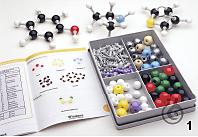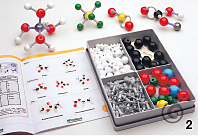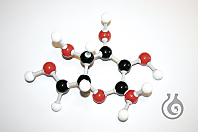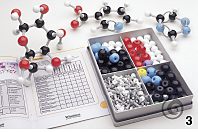 |
|||||||||||||||||||||||||||||||||||||||||
| Main -> Teaching aids -> Demonstration aids -> Demonstration Aids | |||||||||||||||||||||||||||||||||||||||||
| MOLYMOD Molecular Modeling Sets, WINLAB® | |||||||||||||||||||||||||||||||||||||||||
|
The MOLYMOD molecular modeling sets are ideal for making the three-dimensional structure of a molecule visible and explaining in a clearly understandable way for example spatial restrictions in the motion behavior of molecules. Intended for making a great variety of inorganic molecules, as well as various organic substance classes. Though the number of carbon atoms is relatively small, this modeling set is suitable for explaining terms like isomerism, stereochemistry, and conformation. Contents: 14 × hydrogen / 2 × nitrogen / 6 × oxygen / 3 × sulfur / 1 × phosphor / 6 × carbon / 6 × halogenides / 9 × metal / 1 × sp³ / 1 × dsp³ / 1 × d²sp³ and 35 bonding elements, booklet
Molecular modeling set AC-OC Teacher The larger, much more comprehensive variant of the Basic set Contents: 14 × hydrogen / 20 × carbon / 22 × oxygen / 8 × halogenides / 10 × nitrogen / 7 × phosphor / 13 × sulfur / 14 × metal plus 86 bonding elements, booklet
Molecular modeling set OC-Student This set is intended for making models of basic, small organic chemistry molecules, for explaining various functional groups within the molecules, and for promoting the general understanding of the structure of molecules up to stereochemistry. Contents: 20 × hydrogen / 12 × carbon / 4 × halogenides / 4 × nitrogen / 2 × sulfur / 6 × oxygen / 1 × phosphor / 1 × metal plus 64 bonding elements
Molecular modeling set OC-Teacher Much more comprehensive variant of the Student set. Contents: 40 × hydrogen / 38 × carbon / 12 × oxygen / 8 × halogenides / 4 × nitrogen / 2 × sulfur / 4 × phosphor / 3 × metal plus 140 bonding elements
Molecular modeling set for biochemistry BC-Basic The BC Basics is intended for making models of heterocyclical hydrocarbons in two different ways. The first method is a model using double bonds. Alternative, it is possible to move away from a resonance structure and show all bonds as single bonds. In addition to the structure of all main amino acids, the set can also be used to explain the basics of stereochemistry. Furthermore, a large number of natural substances can be modelled. Contents: 25 × hydrogen / 21 × carbon / 13 × oxygen / 11 × nitrogen / 1 × phosphor / 1 × sulfur plus 50 bonding elements
|     |
||||||||||||||||||||||||||||||||||||||||